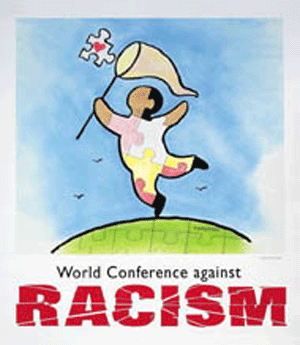
World Conference against Racism, Racial Discrimination,
South African Christians and international ecumenical movement unite against racism
Xenophobia and Related Intolerance
1 September 2001
by Stephen Webb
Hundreds of Christians from around the world gathered for a service at the Methodist Central Mission, a candlelight procession through central Durban, and another service outside City Hall.
Under the theme "Christians unite against racism: May they all be one (John 17:21)", worshippers listened to readings and prayers from international church leaders, including Presiding Bishop Mvumelwano Dandala of the Methodist Church of Southern Africa. Dandala is also the president of the South African Council of Churches (SACC), and the leader of the World Council of Churches (WCC) delegation to the World Conference Against Racism, Racial Discrimination, Xenophobia and Related Intolerance (WCAR).
Participating in the service were Cardinal Wilfrid Napier, archbishop of Durban, Thudiso Virginia Gcabashe, honorary life vice-president of the SACC, the Rev. Dr Sirirat Pusurinkham from the Church of Christ in Thailand, Bishop Rubin Phillip, Anglican bishop of Natal, Suzanne Lind from the Mennonite Central Committee, SACC general secretary, the Rev. Dr Molefe Tsele, Bishop Purity Malinga from the Methodist Church of Southern Africa, Frans Klopper from the Dutch Reformed Church, John McCullough from Church World Service USA, and Bishop Patrick Matolengwe from the SACC.
The English-language service included readings in Zulu and Thai, hymns in Zulu, drummers, African dancers, and a marimba band.
While the momentum and focus of the fight against racism seems to have weakened in the years since the victory over apartheid, the number of people and number of church leaders attending the Durban service indicated the significance for local churches of having the WCAR in the city.
As one church leader said, "Just by being here you have challenged us to reawaken our role in the struggle against racism in this country."
In his sermon, Bishop Phillip said Christians must acknowledge and confess that racism and other forms of prejudice and intolerance still exist in the church. "We must cry: Lord have mercy, Christe Eleison, Nkosi Sihawukele."
He said it is necessary to apologize to and seek forgiveness from one another "if our quest for genuine unity and reconciliation is to bear lasting fruit. Instead of being defensive about and denying the existence of racism, let us rather have the grace to apologize for our acts - or the nations’ acts - of racism and to seek forgiveness from those whom we or our forbears have offended. To close the door on forgiveness is to close the door to true reconciliation."
On the other hand, he said, those who have been at the receiving end of racism must also find the courage to forgive, however difficult that may be. "To forgive the other is to set that person free and to contribute to her discovering her full humanity, which was eroded in the act of racist behaviour."
"I am convinced that if South Africans (as I am sure is the case with other nations) are to discover their new humanity in this beautiful and incredible land, then we must confess our wrongs, seek forgiveness and find the grace to forgive," he said.
At a reception following the service,WCC programme executive for combating racism Marilia Schüller said the international ecumenical community was very close to the South African churches during the apartheid period.
"Tonight it felt as if we had restored that friendship. It felt again as if the international ecumenical movement and the local churches are indeed united against racism," she said.